Thomas Hardy Poems
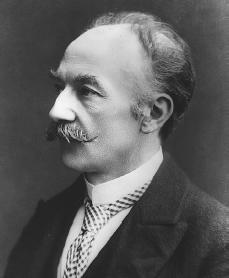
| Thomas Hardy June 2, 1840 – January 11, 1928 English poet and novelist |
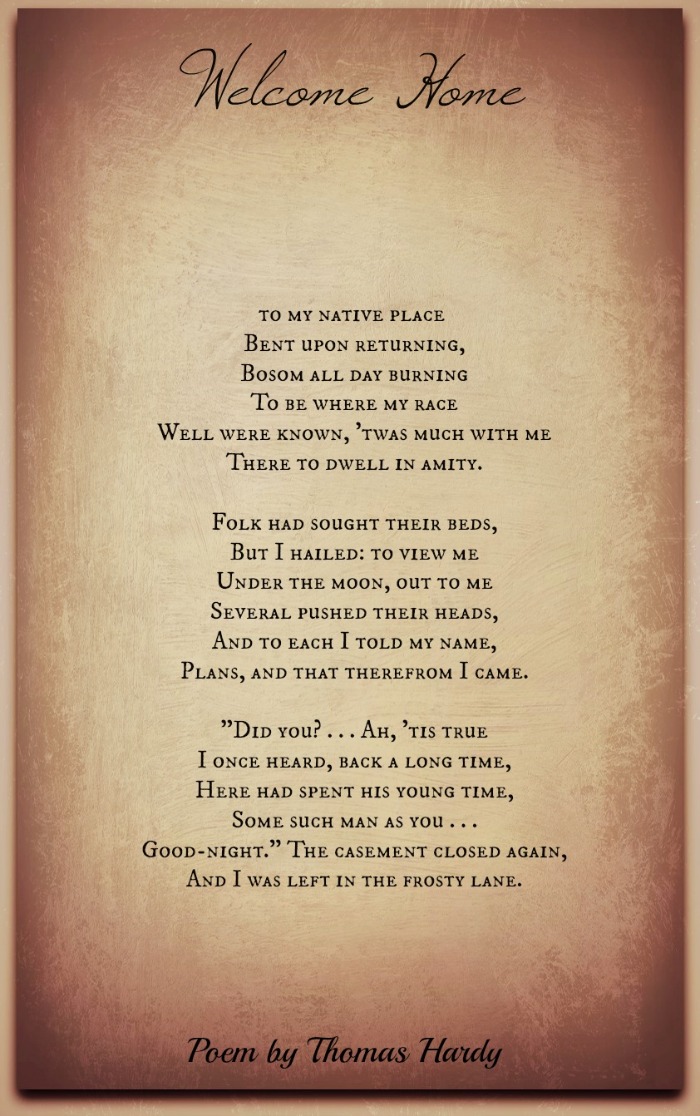 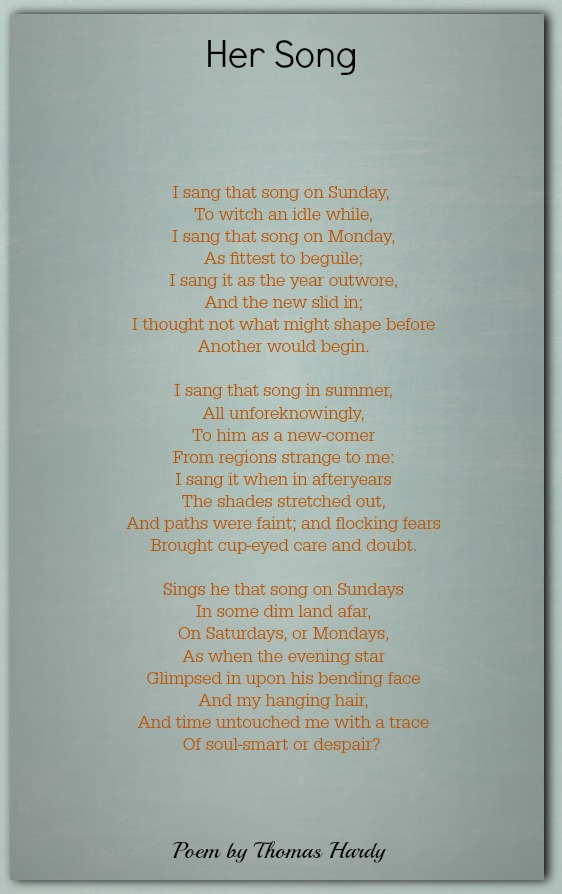 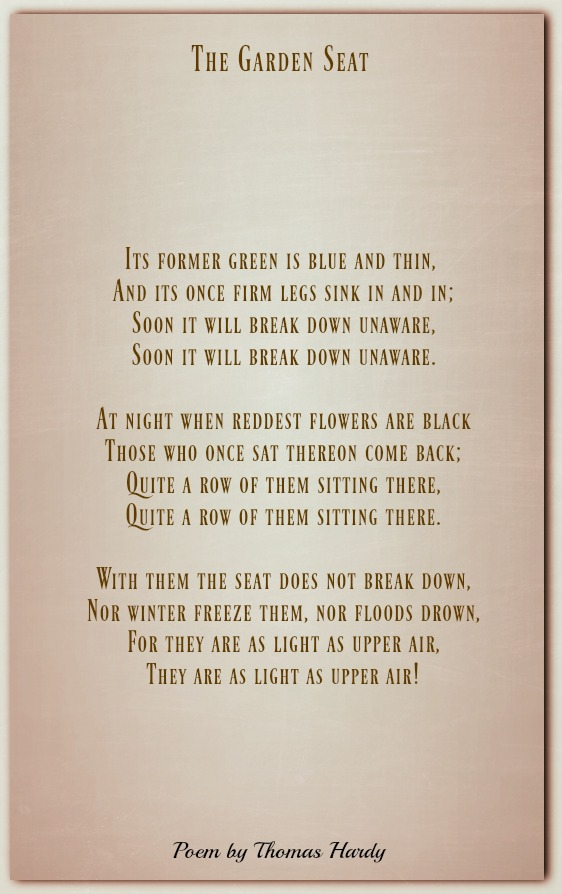 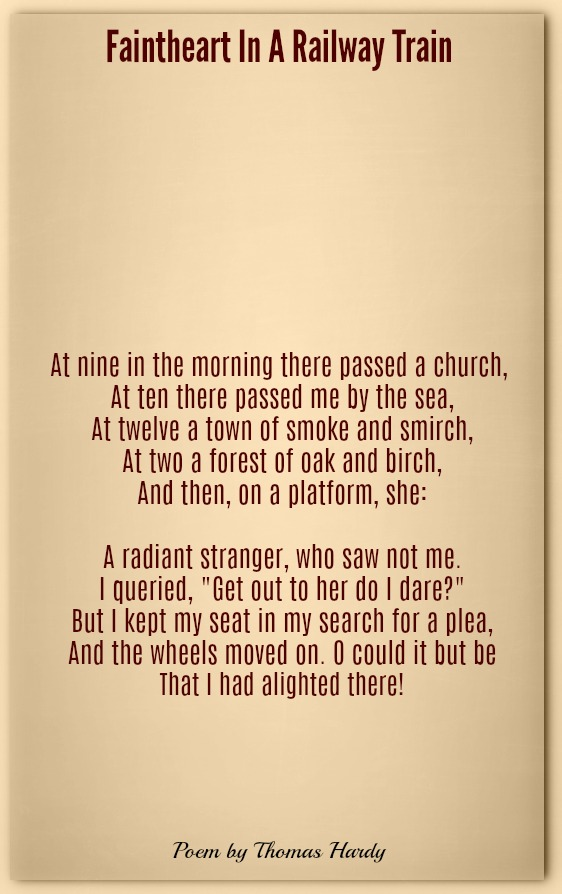 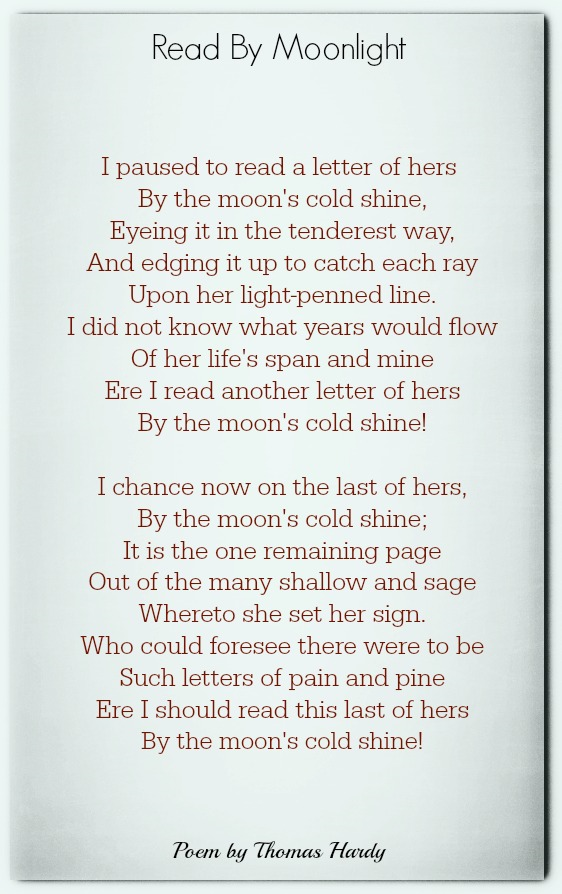 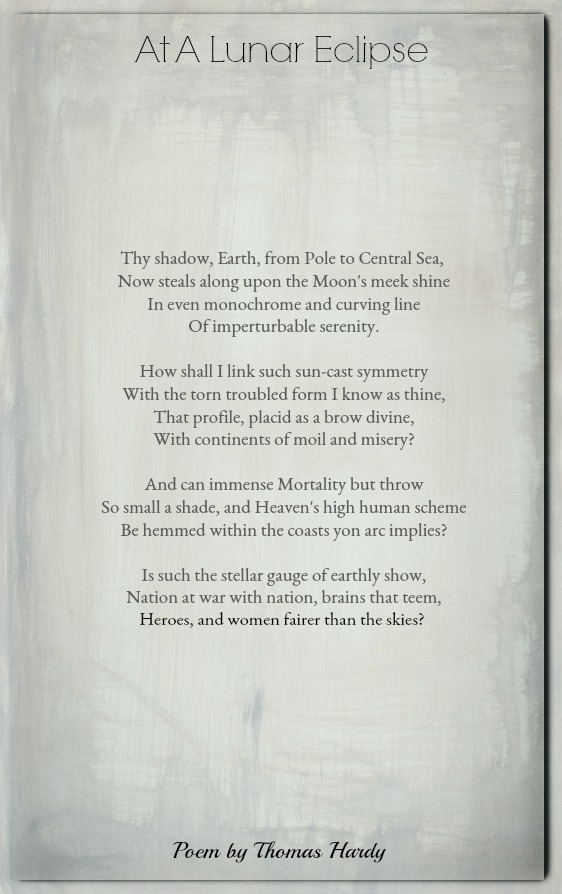 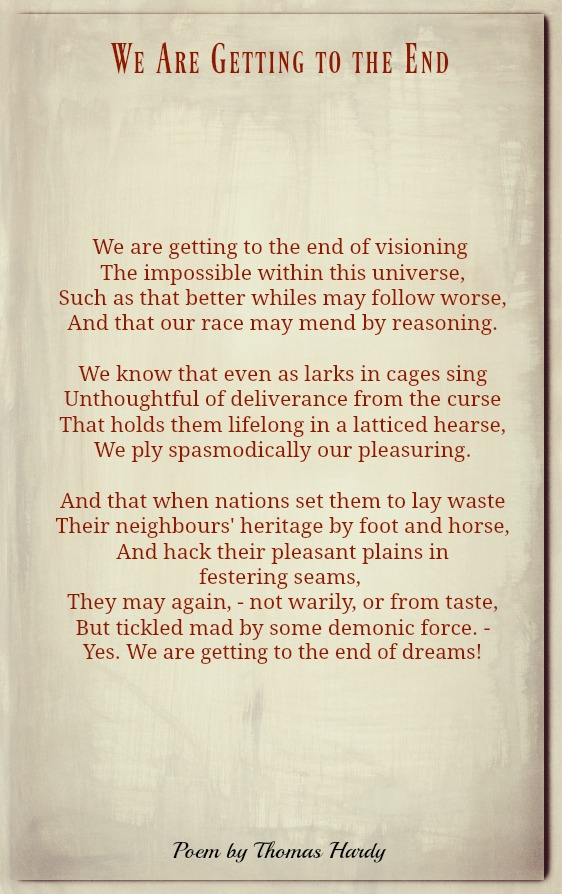 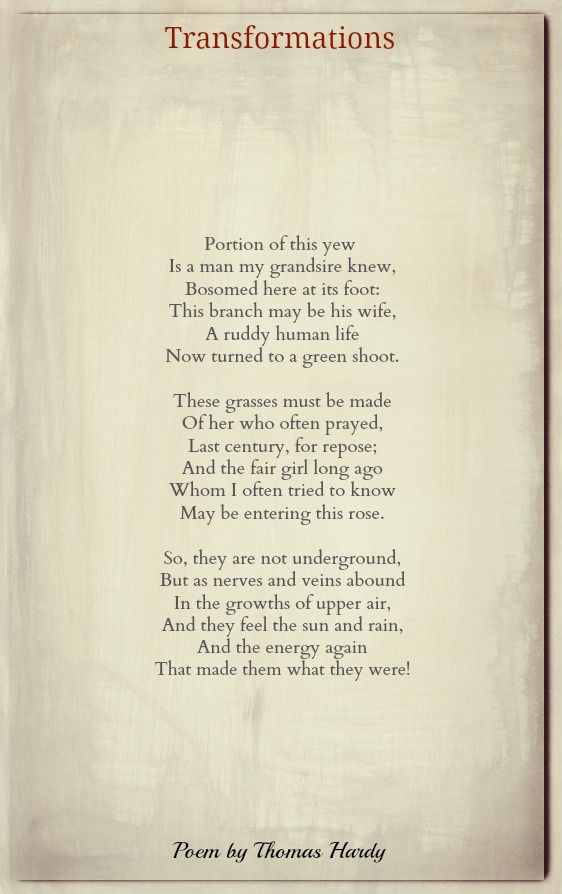 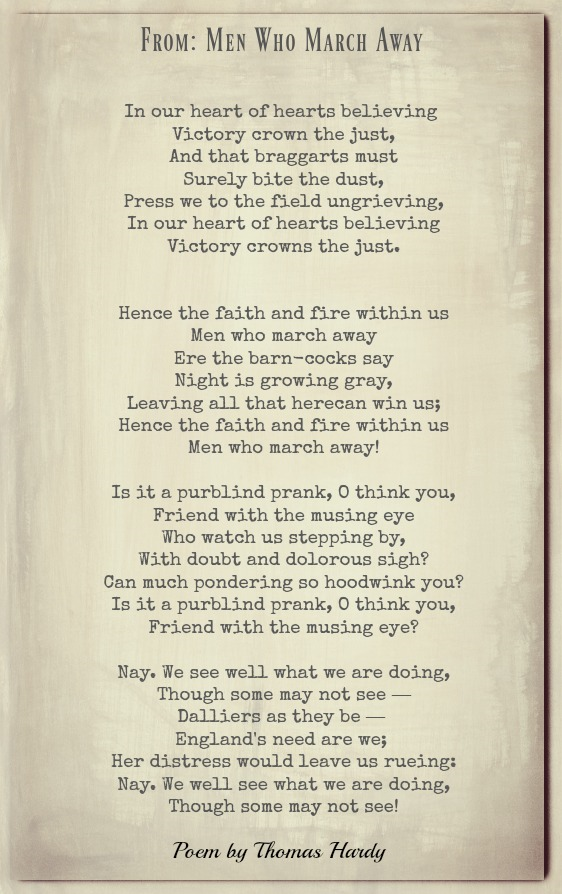  A Broken Appointment You did not come, And marching Time drew on, and wore me numb. Yet less for loss of your dear presence there Than that I thus found lacking in your make That high compassion which can overbear Reluctance for pure lovingkindness' sake Grieved I, when, as the hope-hour stroked its sum, You did not come. You love not me, And love alone can lend you loyalty; -I know and knew it. But, unto the store Of human deeds divine in all but name, Was it not worth a little hour or more To add yet this: Once you, a woman, came To soothe a time-torn man; even though it be You love not me. After A Journey I come to interview a Voiceless ghost; Whither, O whither will its whim now draw me? Up the cliff, down, till I'm lonely, lost, And the unseen waters' soliloquies awe me. Where you will next be there's no knowing, Facing round about me everywhere, With your nut-coloured hair, And gray eyes, and rose-flush coming and going. Yes: I have re-entered your olden haunts at last; Through the years, through the dead scenes I have tracked you; What have you now found to say of our past — Viewed across the dark space wherein I have lacked you? Summer gave us sweets, but autumn wrought division? Things were not lastly as firstly well With us twain, you tell? But all's closed now, despite Time's derision. I see what you are doing: you are leading me on To the spots we knew when we haunted here together, The waterfall, above which the mist-bow shone At the then fair hour in the then fair weather, And the cave just under, with a voice still so hollow That it seems to call out to me from forty years ago, When you were all aglow, And not the thin ghost that I now frailly follow! Ignorant of what there is flitting here to see, The waked birds preen and the seals flop lazily, Soon you will have, Dear, to vanish from me, For the stars close their shutters and the dawn whitens hazily. Trust me, I mind not, though Life lours, The bringing of me here; nay, bring me here again! I am just the same as when Our days were a joy, and our paths through flowers. Under The Waterfall 'Whenever I plunge my arm, like this, In a basin of water, I never miss The sweet sharp sense of a fugitive day Fetched back from its thickening shroud of gray. Hence the only prime And real love-rhyme That I know by heart, And that leaves no smart, Is the purl of a little valley fall About three spans wide and two spans tall Over a table of solid rock, And into a scoop of the self-same block; The purl of a runlet that never ceases In stir of kingdoms, in wars, in peaces; With a hollow boiling voice it speaks And has spoken since hills were turfless peaks.' 'And why gives this the only prime Idea to you of a real love-rhyme? And why does plunging your arm in a bowl Full of spring water, bring throbs to your soul?' 'Well, under the fall, in a crease of the stone, Though precisely where none ever has known, Jammed darkly, nothing to show how prized, And by now with its smoothness opalized, Is a grinking glass: For, down that pass My lover and I Walked under a sky Of blue with a leaf-wove awning of green, In the burn of August, to paint the scene, And we placed our basket of fruit and wine By the runlet's rim, where we sat to dine; And when we had drunk from the glass together, Arched by the oak-copse from the weather, I held the vessel to rinse in the fall, Where it slipped, and it sank, and was past recall, Though we stooped and plumbed the little abyss With long bared arms. There the glass still is. And, as said, if I thrust my arm below Cold water in a basin or bowl, a throe From the past awakens a sense of that time, And the glass we used, and the cascade's rhyme. The basin seems the pool, and its edge The hard smooth face of the brook-side ledge, And the leafy pattern of china-ware The hanging plants that were bathing there. 'By night, by day, when it shines or lours, There lies intact that chalice of ours, And its presence adds to the rhyme of love Persistently sung by the fall above. No lip has touched it since his and mine In turns therefrom sipped lovers' wine.' The Voice Woman much missed, how you call to me, call to me, Saying that now you are not as you were When you had changed from the one who was all to me, But as at first, when our day was fair. Can it be you that I hear? Let me view you, then, Standing as when I drew near to the town Where you would wait for me: yes, as I knew you then, Even to the original air-blue gown! Or is it only the breeze, in its listlessness Travelling across the wet mead to me here, You being ever dissolved to wan wistlessness, Heard no more again far or near? Thus I; faltering forward, Leaves around me falling, Wind oozing thin through the thorn from norward, And the woman calling. A Sign-Seeker I MARK the months in liveries dank and dry, The day-tides many-shaped and hued; I see the nightfall shades subtrude, And hear the monotonous hours clang negligently by. I view the evening bonfires of the sun On hills where morning rains have hissed; The eyeless countenance of the mist Pallidly rising when the summer droughts are done. I have seen the lightning-blade, the leaping star, The caldrons of the sea in storm, Have felt the earthquake's lifting arm, And trodden where abysmal fires and snowcones are. I learn to prophesy the hid eclipse, The coming of eccentric orbs; To mete the dust the sky absorbs, To weigh the sun, and fix the hour each planet dips. I witness fellow earth-men surge and strive; Assemblies meet, and throb, and part; Death's soothing finger, sorrow's smart; —All the vast various moils that mean a world alive. But that I fain would wot of shuns my sense— Those sights of which old prophets tell, Those signs the general word so well, Vouchsafed to their unheed, denied my watchings tense. In graveyard green, behind his monument To glimpse a phantom parent, friend, Wearing his smile, and "Not the end!" Outbreathing softly: that were blest enlightenment; Or, if a dead Love's lips, whom dreams reveal When midnight imps of King Decay Delve sly to solve me back to clay, Should leave some print to prove her spirit-kisses real; Or, when Earth's Frail lie bleeding of her Strong, If some Recorder, as in Writ, Near to the weary scene should flit And drop one plume as pledge that Heaven inscrolls the wrong. —There are who, rapt to heights of trancéd trust, These tokens claim to feel and see, Read radiant hints of times to be— Of heart to heart returning after dust to dust. Such scope is granted not my powers indign… I have lain in dead men's beds, have walked The tombs of those with whom I'd talked, Called many a gone and goodly one to shape a sign, And panted for response. But none replies; No warnings loom, nor whisperings To open out my limitings, And Nescience mutely muses: When a man falls he lies. Neutral Tones WE stood by a pond that winter day, And the sun was white, as though chidden of God, And a few leaves lay on the starving sod, —They had fallen from an ash, and were gray. Your eyes on me were as eyes that rove Over tedious riddles solved years ago; And some words played between us to and fro— On which lost the more by our love. The smile on your mouth was the deadest thing Alive enough to have strength to die; And a grin of bitterness swept thereby Like an ominous bird a-wing…. Since then, keen lessons that love deceives, And wrings with wrong, have shaped to me Your face, and the God-curst sun, and a tree, And a pond edged with grayish leaves. A Thunderstorm In Town She wore a 'terra-cotta' dress, And we stayed, because of the pelting storm, Within the hansom's dry recess, Though the horse had stopped; yea, motionless We sat on, snug and warm. Then the downpour ceased, to my sharp sad pain, And the glass that had screened our forms before Flew up, and out she sprang to her door: I should have kissed her if the rain Had lasted a minute more. Channel Firing That night your great guns, unawares, Shook all our coffins as we lay, And broke the chancel window-squares, We thought it was the Judgment-day And sat upright. While drearisome Arose the howl of wakened hounds: The mouse let fall the altar-crumb, The worms drew back into the mounds, The glebe cow drooled. Till God called, "No; It's gunnery practice out at sea Just as before you went below; The world is as it used to be: "All nations striving strong to make Red war yet redder. Mad as hatters They do no more for Christés sake Than you who are helpless in such matters. "That this is not the judgment-hour For some of them's a blessed thing, For if it were they'd have to scour Hell's floor for so much threatening…. "Ha, ha. It will be warmer when I blow the trumpet (if indeed I ever do; for you are men, And rest eternal sorely need)." So down we lay again. "I wonder, Will the world ever saner be," Said one, "than when He sent us under In our indifferent century!" And many a skeleton shook his head. "Instead of preaching forty year," My neighbour Parson Thirdly said, "I wish I had stuck to pipes and beer." Again the guns disturbed the hour, Roaring their readiness to avenge, As far inland as Stourton Tower, And Camelot, and starlit Stonehenge. Her Dilemma THE two were silent in a sunless church, Whose mildewed walls, uneven paving-stones, And wasted carvings passed antique research; And nothing broke the clock's dull monotones. Leaning against a wormy poppy-head, So wan and worn that he could scarcely stand, —For he was soon to die,—he softly said, "Tell me you love me!"—holding hard her hand. She would have given a world to breathe "yes" truly, So much his life seemed hanging on her mind, And hence she lied, her heart persuaded throughly, 'Twas worth her soul to be a moment kind. But the sad need thereof, his nearing death, So mocked humanity that she shamed to prize A world conditioned thus, or care for breath Where Nature such dilemmas could devise. |
Return To Famous Poets
Thomas Hardy Poems
